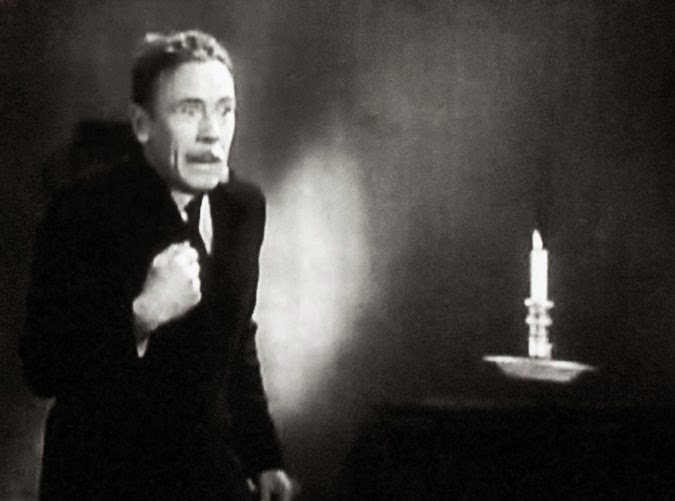 Three cosmic beings are discussing humanity and one, the Power Giver, decides to give unlimited power to one human chosen at random. Down on Earth, mild-mannered Roland Young is involved in a pub discussion about miracles, which he says are acts of will whose outcomes are "contrary to nature." He tries to turn an oil lamp upside down with the power of his mind and is as surprised as anyone when he can (pictured at left). The next day, at the store where he works, he heals a co-worker's sprained arm and cleans up the place like Mary Poppins cleaned up Jane and Michael's bedroom. On the street, he tells a cop to "go to blazes" and the cop winds up in hell—though when Young realizes what's happened, he send him to San Francisco instead. But when he tries to get a woman to love him, he finds out that his powers do not affect the human heart. Instead, he sets out to revamp the entire world into his idea of a peaceful utopia. He clashes with a colonel (Ralph Richardson) when he literally turns his weapons into ploughshares. When Richardson asks what will happen without war, Young replies, "We'd just go about loving one another," to which an astonished Richardson says, "Are you mad? Have you no sense of decency?" Of course, Young's utopia is a mess and he has to use his powers one last time to straighten things out.
Three cosmic beings are discussing humanity and one, the Power Giver, decides to give unlimited power to one human chosen at random. Down on Earth, mild-mannered Roland Young is involved in a pub discussion about miracles, which he says are acts of will whose outcomes are "contrary to nature." He tries to turn an oil lamp upside down with the power of his mind and is as surprised as anyone when he can (pictured at left). The next day, at the store where he works, he heals a co-worker's sprained arm and cleans up the place like Mary Poppins cleaned up Jane and Michael's bedroom. On the street, he tells a cop to "go to blazes" and the cop winds up in hell—though when Young realizes what's happened, he send him to San Francisco instead. But when he tries to get a woman to love him, he finds out that his powers do not affect the human heart. Instead, he sets out to revamp the entire world into his idea of a peaceful utopia. He clashes with a colonel (Ralph Richardson) when he literally turns his weapons into ploughshares. When Richardson asks what will happen without war, Young replies, "We'd just go about loving one another," to which an astonished Richardson says, "Are you mad? Have you no sense of decency?" Of course, Young's utopia is a mess and he has to use his powers one last time to straighten things out.This fantasy, with a screenplay by H. G. Wells based on one of his stories, is unusual in its feel and tone. It’s far from a big budget Hollywood film, being a middle-budget British film, yet it manages to do a decent job with special effects and sets and such. It begins on the intimate scale of one man and his small world of acquaintances, then expands to include the entire world, then shrinks back at the end. Young, an actor who is always fun to see, does a nice job in the lead, and in addition to Richardson (also always welcome) the cast includes Ernest Thesiger and Edward Chapman, and George Sanders has a small role as one of the cosmic beings. The film walks a fine line between sweet and cynical, but it keeps its balance most of the time. [TCM]

No comments:
Post a Comment